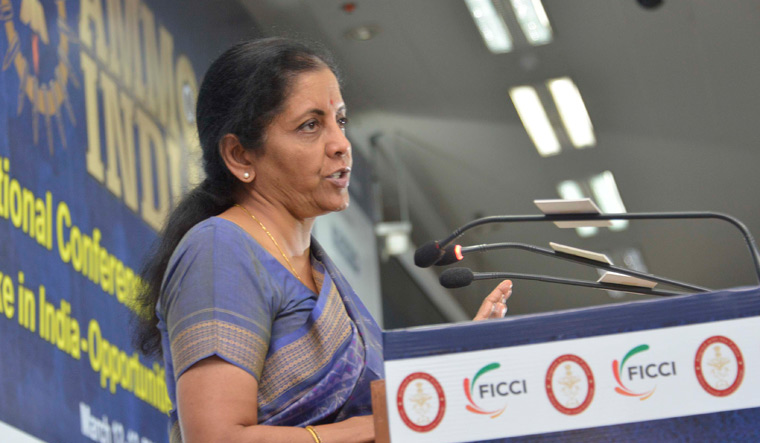Aiming to address the issue of deficiency of ammunition available with the armed forces, Defence Minister Nirmala Sitharaman, while calling for revitalisation of defence sector public undertaking units, invited private players to invest in defence sector as the area has vast opportunities.
Also Read
- China's plan to cripple US Navy's CEC network revealed: PLA report shows weak links in the high-tech US system
- Congress amended Constitution to help Gandhi family: Nirmala Sitharaman in Rajya Sabha
- On Vijay Diwas, PM Modi, President Murmu lead the nation in paying homage to soldiers of 1971 war against Pakistan
- Navy Commander-in-Chief declares Russian naval superiority amid Arctic power struggle
- Deployment of advanced tech has declined drone activity along International Border in Jammu: BSF
- Taking on China's frontier challenge: India's 25-tonne light tank fires with consistent accuracy at 4,200 metres height
Speaking at the 'International Conference on Military Ammunition: Make in India—Opportunities and Challenges', Sitharama said her ministry has identified the opportunity that exists in this area, while adding that currently there are 37 defence licensed companies to manufacture arms and ammunition, and the figure might rise in the future.
"I encourage the private sector to come in the defence sector because of the agility they have shown. They have identified the opportunity that exists in this area," Sitharaman told a gathering of representatives from domestic and international ammunition manufacturing units, including Ordnance Factory Board. She also explained that the defence sector needed to be increasingly self reliant.
The Comptroller and Auditor General of India, in its report, has reflected the poor status of the ammunition stockpile as 74 per cent of the 170 types of ammunition failed to meet the Minimum Acceptable Risk Level (MARL) requirement, and only 10 per cent met the War Wastage Reserves (WWR) requirements.
The CAG, in its last report tabled in Parliament in 2017, has noted that "no significant improvement took place in the critical deficiency in availability and quality of ammunition." The CAG pointed out that of a total of 152 types of ammunition considered critical by the Indian Army to fight a war, 61 types of ammunition are available for just ten days while only 31 types are available for 40 days.
As many as 12 types of ammunition are available for 30 to 40 days and 26 types are available for a little over 20 days.
Further, Sitharaman said small and medium industries have been given 50 per cent rebate on rental charges in the upcoming DefExpo, to be held in Chennai in April first week.
Her ministry has given Acceptance of Necessity for 8.6 lakh weapons, which includes assault rifles, close quarter battle rifles, carbines and light machine guns for Indian industry. Eight different types of ammunition of 21 variants for tanks, artillery and air defence among others, have been selected to be manufactured by the Indian industry.
According to the defence minister, the import of raw material was inevitable in some areas. She noted that defence PSUs needed to be made a bit more dynamic. "We have to revitalise them," she concluded.
Addressing the event, joint secretary (land systems), ministry of defence, Sanjay Prasad, while pushing hard for the modernistion of ordnance factories, said, "Recently, the ministry has given permission to the OFBs to tie up with foreign players in the industry to meet requirement of the armed forces. Earlier, OFBs have to take permission from the government before going to any partnership with a foreign player."
Giving perspective on opportunities for a collaborative approach for manufacturing of small arms and ammunition, senior general manager, ammunition factory Khadki, Pune, M.K. Mohapatra said they have opened the sector for developing small arms for private players.
Speaking on behalf of the private players, Ashok Wadhawan, president, Punj Lloyd Limited said," Despite spending several years in the market, private industry is yet to gain confidence in the armed forces. Private players can fill the gap between OFBs and forces requirement, because armed forces need more than what OFBs can deliver on time."


